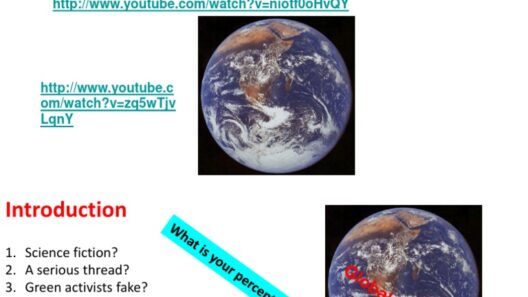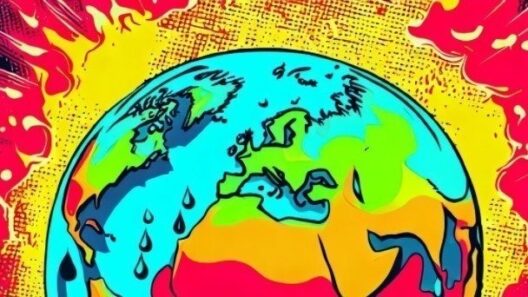Global warming has emerged as one of the most contentious issues of our time, igniting fervent debates across political, scientific, and social landscapes. While a consensus among climate scientists affirms the reality of global warming and its anthropogenic roots, a significant portion of the population continues to harbor skepticism. Understanding why some people resist the notion of global warming is crucial for fostering constructive dialogue and real change. Various factors contribute to this skepticism, ranging from cognitive biases to socio-political influences, and unraveling these threads offers valuable insights into the broader implications for climate policy and communal action.
To begin with, one of the most formidable barriers to accepting the reality of global warming is rooted in cognitive dissonance. Many individuals possess a deep-seated belief in the status quo, finding comfort within familiar frameworks. When faced with information that contradicts their beliefs—such as the stark realities of climate change—individuals may experience discomfort. This discomfort can lead to a rejection of evidence, as embracing the reality of global warming would necessitate an acknowledgment of personal responsibility and require lifestyle changes. The psychological resistance to modify behavior is a powerful motivator in the realm of climate change denial.
Another facet of this skepticism is the influence of misinformation. In an age saturated with information, parsing fact from fiction has become increasingly challenging. Disinformation campaigns, often propagated through social media platforms, can mislead individuals regarding the science of climate change. Such campaigns frequently undermine scientific consensus, presenting flawed studies or selectively interpreting data to bolster a pre-existing narrative of doubt. As a result, individuals who encounter these misleading narratives may become entrenched in their opposition to global warming, fortified by the erroneous belief that they are engaging with credible dissent.
Moreover, the issue of trust plays a pivotal role in how individuals perceive climate change. Many skeptics express distrust towards scientists and institutions associated with climate science, viewing them as biased or politically motivated. This skepticism can be exacerbated by historical instances in which scientific findings have been misrepresented or misapplied for political gain. Consequently, some individuals may choose to align themselves with alternative viewpoints, viewing skepticism as a form of intellectual independence. This alignment often moves beyond mere acceptance of misinformation; it forms a part of a broader identity for individuals who drastically mistrust mainstream scientific consensus.
The socio-political landscape also emerges as a significant influence on beliefs regarding global warming. In many contexts, the issue of climate change has become highly politicized, with alignment or opposition frequently correlating with political affiliation. In the United States, for instance, public opinion on climate change often splits along partisan lines. Those identifying with conservative values may view climate change initiatives as governmental overreach or a threat to economic stability. This politically charged environment makes it challenging for evidence-based discourse to penetrate ideological barriers, reinforcing divisions rather than fostering understanding.
Economic concerns further complicate the dialogue surrounding global warming. For some individuals, the implications of climate change policies seem economically daunting. Industries that are heavily reliant on fossil fuels may resist the transition to renewable energy sources, perceiving such shifts as a threat to jobs and economic stability. This anxiety may fuel a desire to disbelieve in the urgency of climate change, as accepting this reality would necessitate not only policy reform but also individual sacrifices that might jeopardize livelihood. The intersection of climate change and economic fears creates a potent cocktail of skepticism that policymakers must navigate carefully.
Additionally, cultural narratives and worldviews significantly shape perspectives on environmental issues. For instance, cultural frameworks that emphasize human dominion over nature may engender a worldview resistant to the premise of climate change. In these narratives, the environment is often perceived as a resource to be exploited rather than a delicate system requiring stewardship. Consequently, such perspectives can lead individuals to disavow scientific evidence of climate change, perceiving it as an affront to their values or way of life. Understanding these cultural dimensions is crucial for crafting effective communication strategies that resonate with diverse audiences.
A significant amount of research illuminates the social dynamics at play within this skepticism. Many individuals derive their beliefs from their social circles, leading to echo chambers that reaffirm pre-existing notions. Communities characterized by a lack of exposure to diverse opinions may cultivate a homogeneous perspective that systematically neglects the urgency of climate science. This insular approach to information distorts public discourse and can effectively hinder collaborative solutions. Encouraging cross-generational and cross-cultural engagements is essential in breaking these echo chambers and enriching discussions around climate change.
In conclusion, the question of why some people do not believe in global warming is a complex interplay of psychological, socio-political, economic, and cultural factors. Addressing this skepticism requires a multi-faceted approach encompassing education, transparent communication, and building trust within communities. As the understanding of climate change deepens, it is imperative to foster an inclusive dialogue that encourages curiosity and opens avenues for collaborative action. Only through understanding the roots of disbelief can we hope to shift perceptions and provoke the necessary changes to combat the impending threats posed by global warming.







